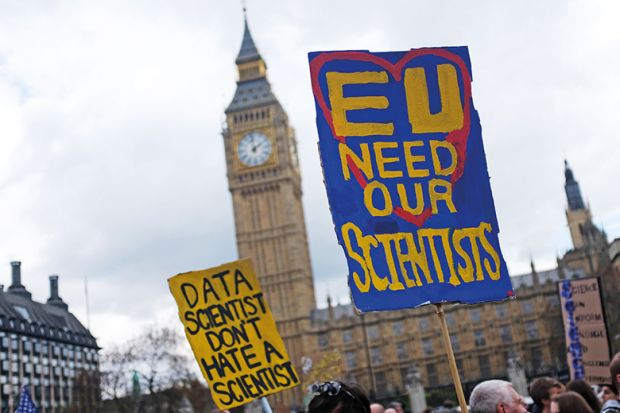As any parent knows, you have to get letters written and dispatched good and early if they’re to make it to the North Pole in time for Santa to consider for Christmas.
Last week, the UK government produced one of its own, setting out a wish list for the possible future arrangement of European research funding and collaboration.
That, at least, was the rather frosty assessment of Kurt Deketelaere, secretary general of the League of European Research Universities, who described the positioning document as “a letter to Santa Claus from Jo Johnson, David Davis and Theresa May”.
Elaborating in an interview with Times Higher Education, he said that since it was accompanied by leaked documents affirming the UK’s commitment to ending free movement of labour, the proposals on science amounted to “wishful thinking, window dressing” and things that are “impossible under current EU law”.
It’s all so depressing, because – as is made abundantly clear in our cover story this week – the withdrawal of the UK from future European Union funding frameworks would be lose-lose-lose (the last of these I’m attributing to humanity, because some of the most exciting, paradigm-shifting science in the world is done under EU collaborative funding arrangements).
What last week’s document does show is that the UK (and this most certainly applies to Johnson) understands the importance of Europe to the health of British science.
Our cover story demonstrates that research leaders and policymakers in Europe are equally clear on the importance of British science to their own success.
An arrangement that ensures Britain’s access to Framework Programme 9, then, seems a no-brainer – particularly since free movement is not a non-negotiable requirement for associated membership.
And yet…and yet. As with so much of the Brexit negotiation, seemingly easy win-wins look in danger of being scuppered by a disastrous loss of goodwill.
The reality is that FP9 will not be dealt with until phase two of the Brexit negotiations, after the divorce bill has been hammered out, by which time that goodwill may have shrivelled further still.
At best, research will be an afterthought. More likely, participation in FP9 will be a carrot/stick to be wielded by the EU once issues such as trade and citizens’ rights are sorted out – which is not a good position for universities to be in.
One experienced observer, speaking at last week’s THE World Academic Summit, described a loss of “generosity”, warning that even if an agreement could be reached, the days of Britain’s being a net beneficiary were over.
During a round-table discussion held in association with Jisc, Philippe De Wilde, deputy vice-chancellor for research at the University of Kent, said: “The UK thinks it is going to subscribe to FP9. But what it will never get again is that it actually gets back more than it puts in.”
He added: “Everyone is sitting there, and only willing to get back exactly the subscription amount. And I think that’s partly due to populism – any sort of international generosity, as you saw for example when the League of Nations was first founded, has now disappeared.”
It’s worth saying that while the UK is indeed nominally a net beneficiary from FP8, overall it is a net contributor to the EU.
So even if it had to pay more to access FP9, covering its own costs, that would still be a saving to the UK Treasury overall – divorce bill notwithstanding.
But it’s also worth adding that whatever is decided about FP9, the mood music in Britain is very bad and EU researchers feel unwelcome. If they leave (and some already have), science will suffer regardless.
This is yet another symptom of the unquantifiable damage being done. And like so much else relating to Brexit, it is a crying shame.
Science is not just a national good, and if it takes some forced goodwill to deliver for the good of the planet, and all living on it, that doesn’t seem like too much to ask. Does it, Santa?
POSTSCRIPT:
Print headline: Bad science
Register to continue
Why register?
- Registration is free and only takes a moment
- Once registered, you can read 3 articles a month
- Sign up for our newsletter
Subscribe
Or subscribe for unlimited access to:
- Unlimited access to news, views, insights & reviews
- Digital editions
- Digital access to THE’s university and college rankings analysis
Already registered or a current subscriber?
